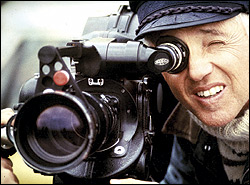Right at the top of SIFF’s must-sees this year is Tell Them Who You Are. On the surface, it’s a mesmerizing portrait of cameraman/filmmaker/political activist Haskell Wexler as he turns 80, by his son Mark, a fellow filmmaker. In truth, it’s something more profound: the attempt by both son and father to fight through years of acrimony to some kind of peace, no matter how late in coming.
Haskell is blazingly clear that he will not be defined by his Oscar-winning, decades-spanning camera work (including Bound for Glory, Coming Home, Who’s Afraid of Virginia Woolf?, and One Flew Over the Cuckoo’s Nest) or directing (Medium Cool). He demands nothing less than cinema verité from his son—a document that will reveal something personal, that will come from the head and the heart. Mark is equally clear about his position: “I’m not a fan. I’m the son of a famous father,” yet he’s gutsy enough to take the challenge.
That the two can come to any understanding at all is one of the film’s miracles, since—professional competitiveness aside—their past is a minefield of unexpressed resentment, which began with a young son’s realization that his father was having affairs and was cemented when Haskell left Mark’s artist-mother after 30 years of marriage. Topping things off, Mark’s teenage act of rebellion against a father renowned for his left-wing politics was to become—and remain—a Republican.
Mark gets remarkably unfettered insights from Haskell’s colleagues, co-workers, and longtime friends, including George Lucas, Martin Sheen, the late, irreplaceable Conrad Hall, John Sayles, and Jane Fonda, who says urgently: “There isn’t anything more important than making peace before it’s too late.” (Her words have extra poignancy now, in the light of her newly published autobiography, which reveals how deeply damaged she was by a truly unreachable father.) That Tell Them should reach a moving conclusion—which you’ll have to see for yourself—should satisfy even Haskell’s definition of direct cinema.
In his telling comments on the Wexler clan, the great documentarian Albert Maysles absolutely nails today’s family-fraught state of cinema with wasabilike pungency: “Psychiatrists agree that of two instincts, to keep quiet and to disclose, the stronger instinct is to disclose.”
Welcome to 2005, when intimate on-camera disclosure isn’t just an instinct, it’s a living and—in its best examples, as here—an art form, where no inner child is left behind, unpublished, or unaired. We in turn become the astonished observers of it all, willing or not. And wasn’t it a long way down?
Who could have guessed, when PBS cracked open An American Family in 1973, and we sat there, rapt, watching the Loud family come apart, that this airing of the most personal and private was a harbinger of what was to come—good, bad, and beyond the pale? Three decades later, we have Jerry Springer and Oprah, the ongoing installments of the 7-Up series, A Heartbreaking Work of Staggering Genius, a tsunami of memoirs, and a proliferation of blogs.
It’s the Era of Entitlement: so many people, so many voices, clamoring to be heard or to be above the herd, with a technology for every tell-all impulse. Rejected by editors? Desktop publishing is there to write your wrongs—or at least print them. If that’s too structured, start your own blog, spill family secrets like loose change. God knows you don’t have to be able to spell to flood the world with familial intimacies from your PC.
It’s a confessional climate that’s perfectly suited to the documentary form, pieces like last year’s Tarnation, made on a Mac—we’re told—for $218 with iMovie software. To some, this excruciating close-up of (possibly) family-inflicted schizophrenia had all the freshness of ’80s performance art; to others, its riffle of home movies and personal mementos was exquisitely calibrated and deeply affecting. No matter what camp you’re in, one fact is inarguable: Tarnation got into theaters and found an audience (the DVD arrives this week). And before Tarnation, there was Capturing the Friedmans, with revelations so overwhelming that it captured both an audience and an Oscar. Pace Tolstoy, all happy families are alike, but every unhappy family contains a future documentary.
Will the excesses of Tarnation become the next wave in documentaries? Possibly, but you have to hope not, that there’ll always be room for intensely personal films—like My Architect, from SIFF ’03, and Tell Them Who You Are—in which the filmmaker doesn’t insist on making himself the star. However, if your son or daughter picks up a Handycam and starts filming, always be ready for your close-up.
Tell Them Who You Are: Harvard Exit, 9:30 p.m. Sat., May 28; and 5 p.m. Tues., May 31.








